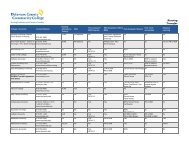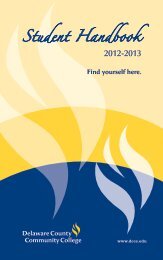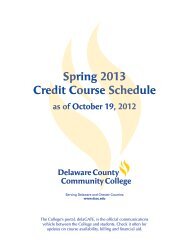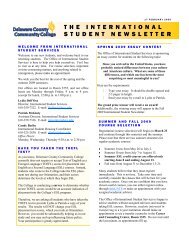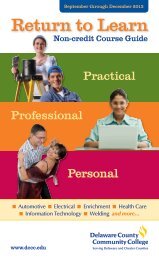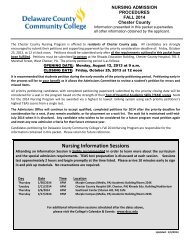2010 Catalog - Delaware County Community College
2010 Catalog - Delaware County Community College
2010 Catalog - Delaware County Community College
Create successful ePaper yourself
Turn your PDF publications into a flip-book with our unique Google optimized e-Paper software.
102 COURSE DESCRIPTIONS<br />
Upon successful completion of this course, the student<br />
should be able to:<br />
• Identify the requirements of a 3D model.<br />
• Identify the requirements of 2D artwork.<br />
• Demonstrate the ability to organize, collect and prepare<br />
material for a 3D video game.<br />
• Understand how to use a 3D modeling software product.<br />
• Demonstrate the ability to design and develop a 2D artwork.<br />
• Demonstrate computer animation techniques.<br />
3 Credits 3 Weekly Lecture Hours<br />
DPR 238 Game Design Theory & Practice<br />
This course will give the student the theory and practical<br />
aspects of the entire game development process. Students<br />
will brainstorm a game idea, establish focus, determine the<br />
storytelling mode, analyze several games, and document<br />
the design and play testing scenarios.<br />
Upon successful completion of this course, the student<br />
should be able to:<br />
• Describe the computer video game development process.<br />
• Identify the techniques of top game designers.<br />
• Analyze and identify the elements that make<br />
successful games.<br />
• Create design documents.<br />
3 Credits 3 Weekly Lecture Hours<br />
DPR 250<br />
Game Portfolio<br />
The focus of the Game Portfolio course is to design a<br />
computer game portfolio that makes evident a student's<br />
knowledge and skills of computer game design, development<br />
and use of game engines. The portfolio is a collection of<br />
material that can be used as an interactive resume, an<br />
archive of work over time or a demonstration of proficiency.<br />
The contents of a student's game portfolio can include<br />
work samples, letters of recommendation, references,<br />
transcripts, GPA, accomplishments/awards, competency<br />
lists, certifications, curricular standards, instructor<br />
assessments/evaluation and work experiences/employer<br />
evaluations. Thus, a student's game portfolio provides the<br />
ability to show work on demand and evidence of their<br />
preparation for a career in the computer game industry.<br />
The objective of this course is for students to demonstrate<br />
the theoretical as well as the technical skills they have<br />
acquired throughout the program. Students will assess<br />
personal strengths to establish a career goal and decide<br />
how to organize their game design and production work in<br />
a graduation portfolio.<br />
Upon successful completion of this course, the student<br />
should be able to:<br />
• Identify the need for a computer game portfolio.<br />
• Identify the target audience of a computer game portfolio.<br />
• Demonstrate the ability to organize, collect and prepare<br />
material for a game portfolio.<br />
• Understand copyright laws for computer games.<br />
• Demonstrate the ability to design and develop a 2D<br />
and 3D computer game.<br />
• Demonstrate the use of object oriented programming<br />
and game engine software tools to develop a computer<br />
game portfolio.<br />
Prereq. All gaming option courses<br />
3 Credits 3 Weekly Lecture Hours<br />
DPR 253<br />
Integrated Software<br />
The integrated software applications course is designed<br />
to be the capstone course in the professionalization of the<br />
Microsoft Office Specialist. The students will complete two<br />
integrated computer simulations. These simulations will<br />
include word processing, database, spreadsheet, and<br />
graphic presentation software. A graphics presentation is<br />
required in the course.<br />
Upon successful completion of this course, the student<br />
should be able to:<br />
• Complete job simulations with 70 percent or<br />
better accuracy.<br />
• Compose letters, memos, and reports using spell checker<br />
and grammar checker.<br />
• Apply the rules of grammar, punctuation and word<br />
division to documents.<br />
• Use word processing, spreadsheet, database, graphic<br />
presentation skills and communications software to<br />
complete simulation projects.<br />
• Use decision-support software such as electronic calendar,<br />
bulletin board, chat room and desktop publishing to<br />
complete office tasks.<br />
3 Credits 3 Weekly Lecture Hours<br />
DRA 100<br />
(DRA) Drama<br />
Introduction to Theatre<br />
This course surveys the world's dramatic literature by<br />
concentrating on text analysis of a representative sample<br />
of plays of varying periods (ancient, classical, modern) and<br />
types (tragedy, comedy, drama). Emphasis is placed on the<br />
plays in performance. Field trips to theatrical productions<br />
may be scheduled. This is not an acting course.<br />
Upon successful completion of this course, students<br />
should be able to:<br />
• Identify through the development of theatre the social,<br />
cultural, economic, religious and political forces that have<br />
shaped the student's world.<br />
• Identify positive values through attending plays that will<br />
broaden and enrich the student's life.<br />
• Develop and expand the student's sensory perception<br />
through the critical reading of play texts.<br />
• Write and present oral critiques of plays seen and<br />
studied, using standards of drama criticism that enlarge<br />
the student's appreciation of the art form.<br />
• Apply theatre attendance in life as a continuing<br />
educational experience that enhances career aspirations<br />
and broadens cultural perspective.<br />
Prereq. ENG 050 and REA 050<br />
3 Credits 3 Weekly Lecture Hours<br />
DRA 105<br />
Acting Shakespeare<br />
Acting Shakespeare is designed with the knowledge that<br />
the plays of Shakespeare were written to be spoken aloud,<br />
by actors on a stage. This course will investigate the plays<br />
of Shakespeare with that reality in mind, and introduce<br />
students to the myriad techniques Shakespeare used in his<br />
writing which assist the actor in the performance of his<br />
characters and the onstage telling of his stories. Acting and<br />
performance techniques from Shakespeare’s day to the<br />
present will be explored through vocal and movement<br />
exercises. Students are required to read several Shakespearean<br />
plays and to analyze the texts with the goal of performing<br />
monologues and scenes from those plays. Plays in performance<br />
will be emphasized and students will watch filmed<br />
stage productions. Students will be required to see a live<br />
theatrical production of a Shakespearean play when possible.<br />
Upon successful completion of this course, students<br />
should be able to:<br />
• Demonstrate, through text analysis and performance, an<br />
understanding of the fundamentals of Shakespeare’s<br />
verse and prose and how these relate to the acting of<br />
those texts<br />
• Demonstrate a working knowledge of acting techniques<br />
which have been applied to the works of Shakespeare<br />
throughout history<br />
• Bring to life one of Shakespeare’s characters from the<br />
plays, both physically and psychologically, and be able to<br />
communicate that character’s needs and intentions<br />
through performance<br />
• Effectively use vocal techniques to bring Shakespeare’s<br />
words, rhythms, and imagery to life<br />
• Work within a group and show an awareness of<br />
ensemble dynamics and cooperation<br />
Prereq. ENG 050 and REA 050<br />
3 Credits 3 Weekly Lecture Hours<br />
DRA 110<br />
Acting I<br />
This acting course is designed to provide students with<br />
the basic rudiments of acting. Emphasis is on movement,<br />
breathing, voice (diction, projection, emphasis, interpretation),<br />
and script and character analysis. Students are required to<br />
read several plays and to attend at least two performances<br />
at area theaters. The hour TBA is provided for rehearsals.<br />
Theatre majors are encouraged to take DRA 100 in<br />
conjunction with this course as it provides insight into<br />
script analysis and staging practices.<br />
Upon successful completion of this course, students<br />
should be able to:<br />
• Describe the procedure for bringing a written script<br />
to performance.<br />
• Demonstrate basic voice and movement techniques.<br />
• Evaluate acting techniques.<br />
• Recognize the various components of an artistic<br />
endeavor, including the roles of self-discipline,<br />
motivation, flexibility, cooperation and creativity.<br />
• Perform short monologues and dialogues.<br />
Prereq ENG 050 and REA 050<br />
3 Credits 3 Weekly Lecture Hours<br />
DRA 111<br />
Acting II<br />
Acting II is a continuation of Acting I. In this course,<br />
students refine skills they developed in Acting I and continue<br />
to explore the acting process through readings, theatre<br />
attendance and performance work. Emphasis is on character<br />
development through improvisation, script analysis,<br />
movement and scene projects. Students also examine the<br />
role of imagination, perception and creativity in acting.<br />
Upon successful completion of this course, students<br />
should be able to:<br />
• Identify period acting styles.<br />
• Demonstrate physical and aesthetic awareness of<br />
acting techniques.<br />
• Demonstrate an understanding of character interpretation<br />
through movement and voice control.<br />
• Work effectively with others on acting projects.<br />
• Demonstrate imaginative and creative talents through<br />
the actualization of theoretical concepts of acting.<br />
Prereq. DRA 110 or Instructor Permission<br />
3 Credits 3 Weekly Lecture Hours<br />
DRA 116<br />
Stagecraft<br />
This is a workshop course; you will learn by doing.<br />
Students have the opportunity to learn how to paint scenic<br />
efforts, design stage lighting and sound, and construct basic<br />
set pieces and architectural details. Students will also learn<br />
the basics of costume and makeup design and apply those<br />
basic concepts, creating costumes and applying makeup<br />
designs such as corrective makeup and old-age. Students<br />
must attend all rehearsals and performances where they<br />
will serve as members of the stage crew or the lighting<br />
and sound crew. Students can expect to work a considerable<br />
number of hours outside the normal classroom<br />
meeting time.<br />
Upon successful completion of this course, students<br />
should be able to:<br />
• Design a simple stage set<br />
• Design basic stage lighting<br />
• Use basic carpenter’s tools safely and with precision<br />
• Paint simple scenic efforts, such as rocks, wood, texture, etc.<br />
• Orchestrate the movements of a stage crew to<br />
efficiently remove and erect stage sets before<br />
during and after performances.<br />
• Operate a basic lighting control board and sound<br />
equipment on cue<br />
DELAWARE COUNTY COMMUNITY COLLEGE




